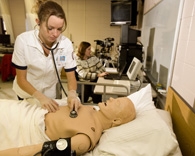Topic: College of Applied Sciences and Technology
October 15, 2008

Like many areas within the College of Applied Sciences and Technology, the School of Nursing has found ways to substantially boost its enrollment.
Where can we grow? What is needed?
Answering these two questions has led Ball State's College of Applied Sciences and Technology (CAST) to quietly become the university's second-largest college.
Based on the number of bachelor's and master's degrees granted, the college was the university's fourth largest 10 years ago. By working closely with industry partners and finding niches for growth, departments have been able to add new programs or expand existing courses that fill industry voids, which have also substantially boosted the number of students in the college.
"The college prides itself on being contemporary, appealing and adapting to fill economic voids," said Mitch Whaley, dean of CAST. "Many of the new programs we've created have grown quickly, and they're attracting students to Ball State who may have gone someplace else."
Building a program
The best endorsements come from potential employers, and many members of CAST's advisory council members rave about the quality of the college's graduates. Industry officials want to be a part of the councils so they can be first in line to hire Ball State graduates, Whaley adds.
"The graduates Ball State produces have been great. They're every bit as good or better than graduates from the more established programs from our region," said Larry Roan, F.A. Wilhelm Construction Company's vice president of business development and chair of the construction management advisory council. "In fact, just in the last year, we had two interns who worked out so well that we hired them as full-time employees."
Advisory council members such as Roan are working to build a nationally ranked program. The dedication has helped construction management to quickly grow since the technology department launched it four years ago. It now has 217 majors and 47 minors, according to Ray Shackelford, department chair.
Additional growth within the technology department comes from two online graduate programs, which were launched in 2002 and grew from around 20 students to 248.
Similar success stories can found throughout the college. Other fast-growth areas include the School of Nursing's online offerings, such as the doctor of nursing practice degree. The coaching master's online program was also an instant success. Only a few years old, it now has 111 students.
Hospitable changes
In the family and consumer sciences department, changes to an existing program have led to dramatic increases in hospitality and food management's enrollment. In the last five years, the program has grown from 54 to 135 students —150 percent growth.
"I believe we turned the corner when we changed the program name to hospitality and food management, and we also added some additional courses, such as one that addresses event management," said Alice Spangler, department chair. "Our focus with hospitality is much broader now, as exemplified by our internship experiences that extend from hotels to theme parks and to a growing variety of restaurants."
By Marc Ransford, Senior Communications Strategist